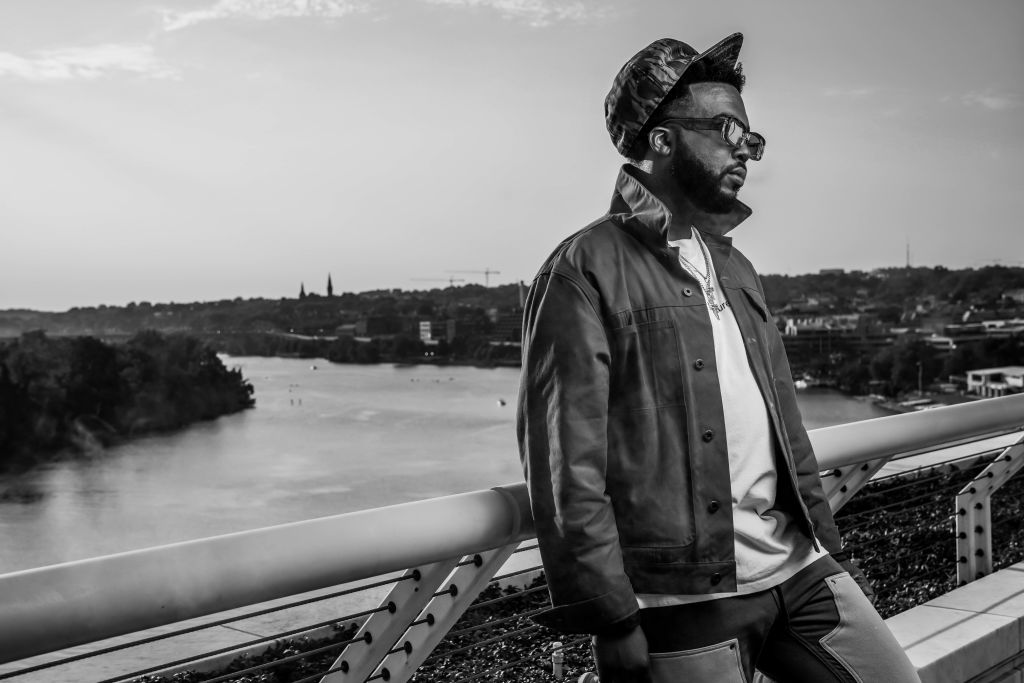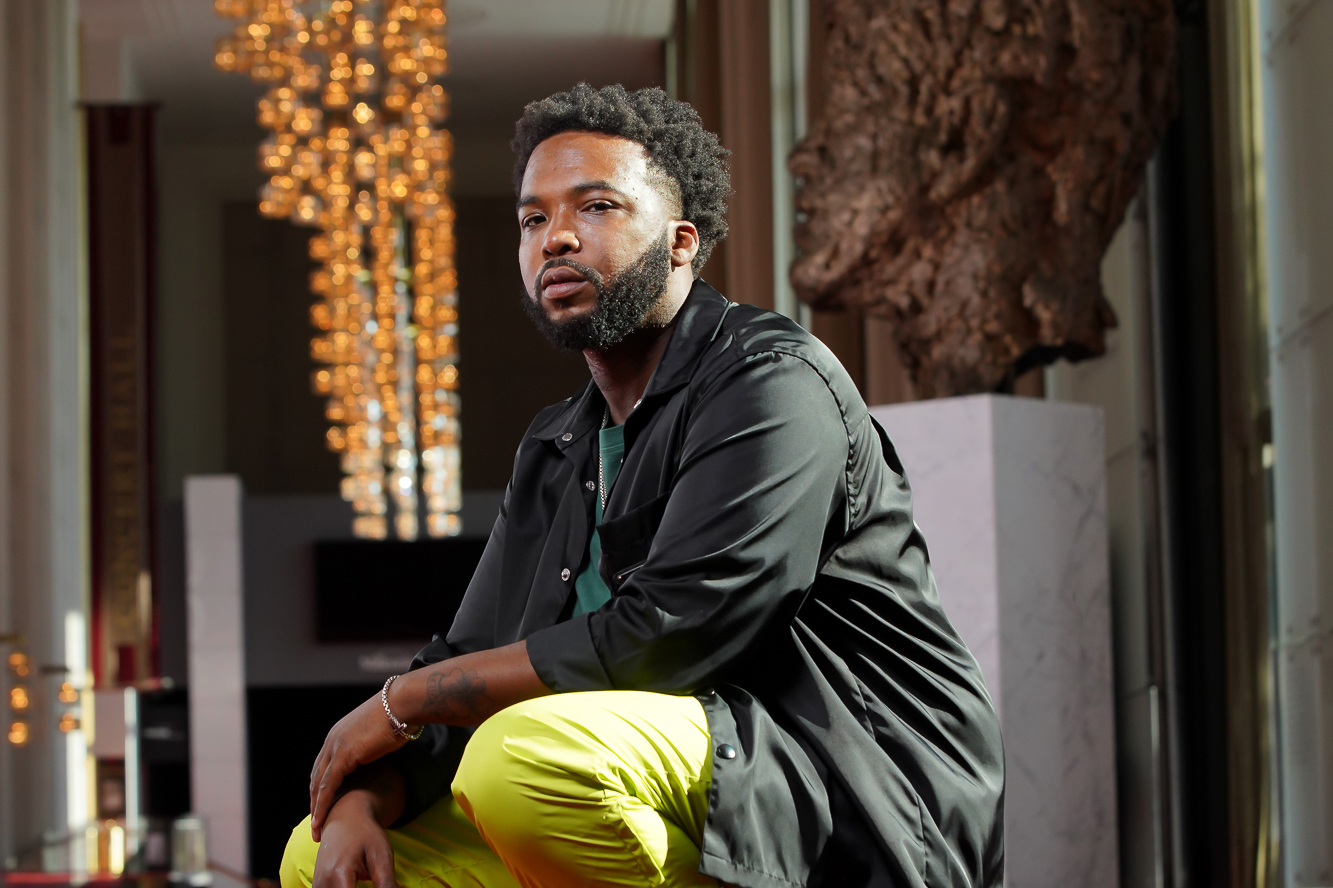Culture
 Justin "Yaddiya" Johnson. Photo by Tony Powell.
Justin "Yaddiya" Johnson. Photo by Tony Powell.
The Growing Legend of Yaddiya
September 1, 2021 @ 10:00am
Justin “Yaddiya” Johnson, or Yaddi to the initiated, is a local star on the rise in D.C.’s arts community. He’s the founder of Long Live GoGo, a local organization committed to advancing racial equity, and a member of the Kennedy Center’s Culture Caucus, which works alongside the center’s social impact team to design events at its annex The REACH. And, he’s unapologetically advancing his mission to preserve go-go music: the musical genre that serves as the heartbeat of D.C.’s Black culture.
Club Promoter to Go-Go Advocate
Yaddi and I meet near Capitol Hill in Moechella the Gallery, his go-go-themed studio, art and entertainment concept space, just days before its grand opening.
Standing inside, he raises — only halfway — one of the street-facing steel garage doors, just enough for sidewalk traffic to catch a glimpse of what’s going on behind the scenes. It’s a clever move by someone well-versed in the art of showmanship.
There’s a complexity to Yaddi that takes some digging, and caffeine, to fully surface. But when it does, you can’t help but be charmed by his effortless smile and laugh at his self-professed identity as a “coffee martian.” In every setting, he brings the perfect blend of humor, humbleness, urgency and hopefulness.
Music and building community are his life passions — though his journey is an unexpected and tangled one.
At the age of 18, Yaddi stumbled into the world of entertainment, first as a member of several street teams for a local club promoter, where he slowly got hip to the local nightlife scene in Maryland and an introduction to go-go; then, as an aspiring entrepreneur, eager to make his own mark as a promoter, in partnership with a friend.
Of course, success never moves in a straight line.
“We started doing high school events without go-go bands and we’re thinking, at our first event, 700 people will show up and pack a sold-out venue,” Yaddi remembers. “[Instead], we get to the venue and there’s 20 people and 10 of them include me, [my business partner] and our friends.”
He learned a valuable lesson that night: Nothing can be done well without authenticity.
Yaddi soon found himself drawn to, and intoxicated by, the iconic music genre. Over time, he grew to appreciate the artists at its forefront, like Chuck Brown, and the friends he knew performing in local go-go bands.
The texture, flair and “tribal vibes” they elicited at live performances were second to none. This awakening precipitated Yaddi’s decision to deeply immerse himself in ensuring the survival of go-go.
“When go-go was at its peak, [go-go musicians] were local celebrities,” Yaddi says. “That whole energy, the live performance element, the drum and percussion element, you can’t see anywhere else but at a go-go show.”
This belief was the driving force behind what would come next.
A Crash Course in All Things Go-Go
While Yaddi was getting a crash course in all things go-go music, including learning about the structure of the industry and growing his business acumen, he was already conceiving a blueprint for forging go-go’s next act.
“I started to see a bigger vision for how these [go-go musicians] could gain a broader fan base [and] essentially get out of D.C.”
Yaddi decided he would jump into the fray by launching his own music career and hitting the Historically Black Colleges and Universities concert circuit, using it as a vehicle to introduce local go-go bands to undergrads across the South.
He took the stage at institutions like North Carolina A&T, Clark University, Morehouse and Spellman, growing his fame and hunger to fuel go-go’s rise.
The next phase of his career took him to the West and Pacific Northwest, where he began recording his own music and layering his sound over EDM tracks.
Meanwhile, back home, go-go’s essence, immortalized only through bright, monumental murals, was diminishing — and even disparaged at times by the current generation of Washingtonians.
This was a troubling reality for Yaddi. Go-go, the genre that propelled his career, was on life-support.
“I was living in Seattle, California and Oregon, and [when I] finally came home, I noticed go-go music wasn’t as prevalent. The cause was starting to diminish.”
A New-Age Form of Protest
In 2017, Yaddi jumped back into reviving go-go in partnership with since-shuttered marketing firm One Love Massive, planning a go-go band reunion and subsequent virtual events, streamed on Facebook under the banner “Back to the GoGo Live.”
Not long after, the highly publicized noise amendment legislation, known as the Amplified Noise Bill, was introduced in the District. The controversial bill aimed to ban street performances that exceed a specified noise level, putting go-go music front-and- center again.
The bill was sparked, in part, by a complaint that the music blasted from a local Metro PCS store, located at Florida Avenue and 7th Street NW, was disruptive to the community. The bill’s emergence inspired what would become a 180-day long demonstration adjacent to the White House: Occupy Lafayette Square.
Yaddi was tapped by local advocates to emcee the events.
“They were looking for people to be the entertainment throughout the protest,” Yaddi remembers. “After the fifth day, I essentially became the frontman of the protest. I was hosting guests like Kathy Griffin and Rosie O’Donnell, and [began] noticing how much politics moved the world and how powerful music was as a mobilizing tool.”
As the face of the protest, Yaddi looked to his go-go roots to elevate the impassioned gatherings.
“I started to call musicians I knew from the go-go industry to perform in front of the White House,” Yaddi says. “We would do go-go style percussion music with political messaging, with me on the mic.”
From there, Yaddi dove even further into advocacy, taking on speaking engagements, and organizing his own protests in the U Street corridor, in collaboration with local artists like the TLB band, a group he had championed in his youth.
This was the beginning of a fierce grassroots movement, spurred by a will to harness go-go’s transformative capacity to unite. Yaddi worked to leverage partnerships established through the goodwill and reluctant celebrity he’d garnered as a prominent community advocate, employing even his own financial resources.
Yaddi knew he would fail if he didn’t keep his foot on the gas.

Yaddiya at the Kennedy Center. Photo by Tony Powell.
He recognized the demonstrations would be ineffective in sporadic waves. For a momentum to flourish, it needed to be steady and unrelenting to enact real, lasting change.
“The biggest slap in the face is when the community has something that gives them hope or energy, [like] a food drive — it’s always once a year,” Yaddi insists. “What kind of momentum is that? How is that really impacting people? [I said] ‘We’ve got to do this every other week.’”
Others quickly took notice, including the president of T-Mobile, who intervened to support the local Metro PCS store owner who helped spark Occupy Lafayette Square.
This national attention inflamed Yaddi. He intensified his efforts and implemented what he describes as “guerilla-style” tactics to organize gatherings, with amazing results: His first event packed U Street with 1,000 people.
These rapid-fire pop-up style events, scheduled for Tuesdays and always promoted two days in advance, were likened to the impromptu West Coast bashes popular in L.A. It was a new age form of protest, evolving right before Yaddi’s eyes.
“In my mind, [I thought], let’s change, let’s update and modernize this whole culture, as we’re showing our descent.”
Yaddi was simply one citizen, well-attuned to the power bestowed by his first amendment rights, who wanted to make a difference. He was also blessed with an uncanny gift to masterfully galvanize others behind his cause.
The next event drew 3,000 participants and Yaddi never looked back.
The third iteration introduced the moniker Moechella, the namesake of the eponymous gallery where we currently stood. It’s a play on the annual Coachella Valley Music and Arts Festival in Indio, California, inspired by the size of the gatherings that reached 5,000 people at their height.
Yaddi’s one nonnegotiable was that each protest embody a spirit of non-violence.
“People were coming from everywhere and really speaking up for go-go, and doing it peacefully,” Yaddi says. “Go-go [has] a stigma of violence that’s prevented it from growing and from being performed. So, I made sure that I called it a peaceful demonstration. That was always my thing, to always push the narrative of peace.”
Authenticity in Shared Spaces
For Yaddi, go-go became a vehicle for fulfilling a greater purpose.
“[Go-go] is the symbol of Black culture,” Yaddi insists. “When you think of trap music, jazz music, or any type of music — that’s the same thing with go-go. We’ve been able to mobilize the community behind political issues and put them in spaces you rarely see Black people in. At the same time, you see people advocating for Black people.”
Yaddi advocates deeply for Black people to have the agency to shape their own destiny by standing up, being heard and taking action, whether it’s through go-go music, or fighting against police brutality. He realized advancing this work requires keeping Black culture at the forefront — and that it must be driven by those who are stewards of the culture.
When the opportunity came to do just that, Yaddi didn’t hesitate.
Now, as a member of the Kennedy Center’s Culture Caucus — dubbed “a leader of social practice and creative community empowerment” — his reach is greater than ever. The initiative is a means for the Kennedy Center to “earn” rather than assume its place within diverse communities, aligning with musical artists and performers to introduce imaginative, inclusive programming.
When asked about the honor, he maintained the same humble, yet fiery spirit that makes Yaddi so magnetic.
“I feel very privileged to [even be] considered part of that umbrella in any way,” Yaddi says. “I love being able to influence change and put true authenticity inside of the equation. I feel I am the symbol of the bottom line.”
The bottom line Yaddi references are the friends (and others) who live in gentrified neighborhoods and feel silenced because of their exclusion from influential circles. Yaddi is well-aware what his appointment to the Caucus represents to those who look like him.
“I’m always looking to keep something authentic, something original and speak truth,” Yaddi says. “In the Culture Caucus, we have all different types of personnel in our cohort. I know my job will be to keep it cool — keep it current, keep it relevant to the culture. I think I’m the symbol of that.”
And many would say local institutions like the John F. Kennedy Center for Performing Arts, which celebrates its 50th Anniversary this year, are emerging as beacons of change, as they evolve alongside the city’s growing diversity while honoring D.C.’s artistic and cultural history.
Moechella the Gallery is the manifestation of this dream. It will offer programming, screenings, artwork displays, loud music, professional classes for kids, the roll out of an evolved version of the Go-Go Live Platform and more. It will be a safe space and a symbol of what Yaddi and others are fighting for: giving voice to those long left behind.
In that vein, Yaddi sees himself as a symbol of what’s possible when those from non-traditional arts spaces are given a real platform. He is a conduit for ensuring that his and Long Live GoGo’s rise are not outliers.
Go-go is the soundtrack, the drumbeat of D.C.’s wildest creative ambitions and Yaddi, the maestro.
Learn more about Yaddi and Long Live GoGo at longlivegogo.com and follow him on Instagram at @yaddiya.







